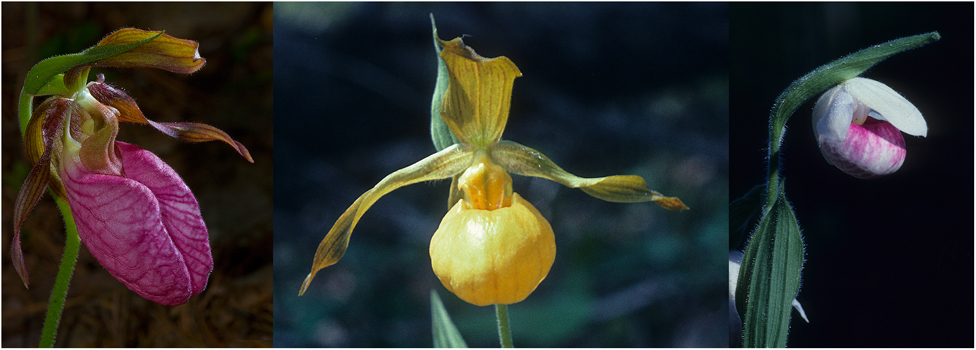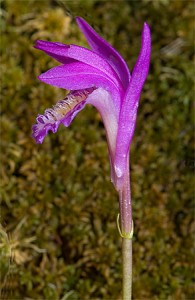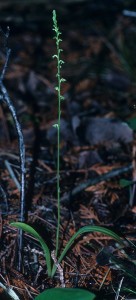Orchids have intrigued people’s imagination for centuries. The plants use different methods to trick pollinators. They have complex flower designs that ensure they release and receive pollen. Some plants mimic insect’s forms and smells. Orchids occur everywhere except Antarctica. Many people are surprised to learn the Michigan has 56 native orchid species. Most of our natives are obscure. Upon showing people a native orchid, their first response is often something such as “that’s an orchid?”
Our five species of Lady-slippers are the orchids that most people see. The first orchid I remember seeing was a Pink Lady-slipper (Cypripedium acaule) at Proud Lake Recreation Area. I think this was before I started elementary school. Those plants grew in a quaking bog and a few years later I saw plants growing in dry soil behind a sand dune. It was the acid soil they required not the moisture.
The Swamp Dragon (Arethusa bulbosa) was another plant that I learned about from one of my father’s Kodachrome slides. The first colony I ever found was back in 1974 in the Keweenaw Peninsula. I leapt across a roadside ditch to explore a rock outcropping and jumped over a few hundred plants. They were growing out of sphagnum moss. I have seen thousands of plants since then.
Alaska Orchid (Platanthera unalascensis) is a disjunct from the west. It grows in the Rocky Mountains, the Black Hills, the eastern end of the Upper Peninsula, the Bruce Peninsula, and the Gaspe Bay area. It has been placed in the genus Habenaria, and also Piperia. Currently, it is grouped with the Rein Orchids in the genus Platanthera. It has been called the “tall, thin, green, nothing.”
I found the plants in the spring of 1979, near Cedarville, Michigan while looking for Calypso. I returned a month later and discovered that the plants were in bud. Ten days later, I drove the 300 miles from my house to the colony (this was before I had heard the term “carbon footprint.”) None of the plants had opened their blossoms. I returned a week later and the deer had browsed off every flower spike. I found plants, sometimes in bud and sometimes in seed. It was over 30 years before I finally saw the plant in flower.
Hunting orchids is a great reason to get out into nature. You never know what you will find when you jump over a ditch or wander onto a limestone outcropping. Just get out and explore.




I think I had some orchids growing on my front lawn. I have been in the same house for 7 years and never saw any sign of them until this year. I accidently ran them over with my lawn mower. I then decided to transplant them into my flower garden. I left the other ones growing on the lawn. I did take pictures, but can’t seem to identify them.
The orchid is probably Helleborine (Epipactis helleborine) which is a weedy orchid. It is not a native and is moving into the area. Check out the Michigan Flora Website. http://michiganflora.net/species.aspx?id=1808
Michigan Nature Guy
I’m going to Goose Creek Nature Sanctuary on a trip with my orchid club in hopes of seeing a native orchid. Anyhow, I stumbled upon your blog while researching Michigan orchids, and thought you might find this link i also happened to stumble upon interesting…
http://michiganflora.net/species.aspx?id=1803
The Michigan Flora site is great. I use it all the time.